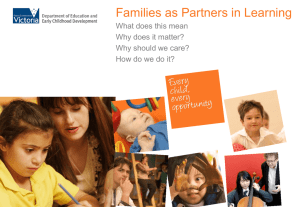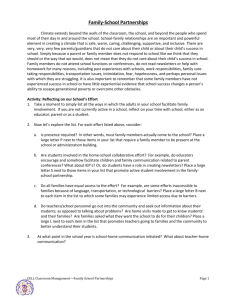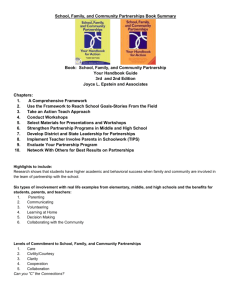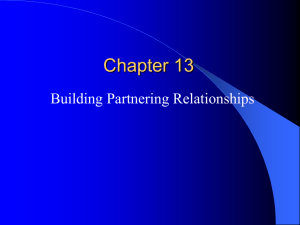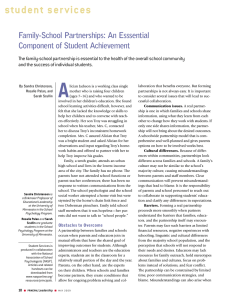'Families as Partners in Learning' presentation for Principals and
advertisement
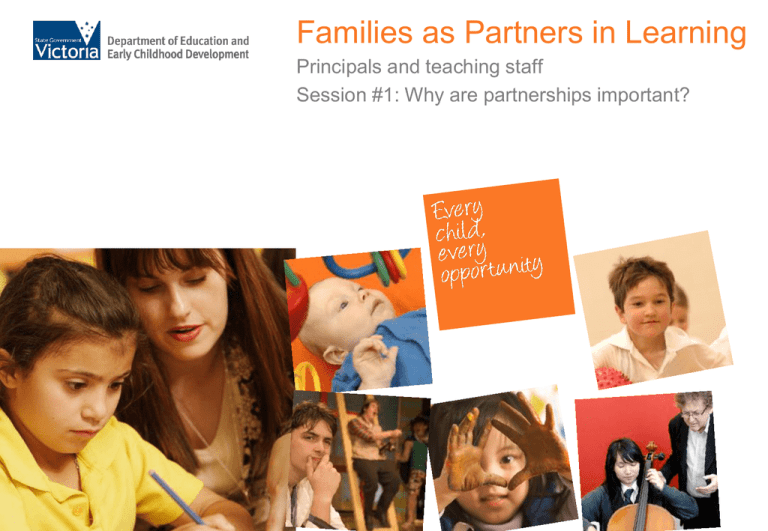
Families as Partners in Learning Principals and teaching staff Session #1: Why are partnerships important? The Melbourne Declaration on Educational Goals for Young Australians Commitment to Action: Developing stronger partnerships • “Parents, carers and families are the first and most important influence in a child's life, instilling the values that will support young people to participate in schooling and contribute to broader local and global communities.” (Ministerial Council on Education, Employment, Training and Youth Affairs, December 2008) 2 The Victorian Context We need a change in focus: From Families Students School/Teachers 4 We need a change in focus: To Social Political Resources Cultural School – Early Childhood Service Child Community Family Services Economy Labour Markets 5 Life-long and life-wide learning Source: Banks, J et al, 2007, Learning in & out of school in diverse environments 6 “…if educators make use of the informal learning that occurs in the homes and communities of students, the achievement gap between marginalized students and mainstream students can be reduced.” (LIFE Center – University of Washington, Stanford University & SRI International supported by the National Science Foundation) 7 The research in unequivocal… • High performing schools have high levels of family and community involvement • This holds equally true for “high poverty” schools as it does for middle class schools • In fact, family participation in education has been found to be twice as predictive of students’ academic success as family socio-economic status – Greatest impact in areas of highest disadvantage – Holds true across ALL levels of education – all ages, all stages Impact on intermediate variables • Reduced absenteeism • Increased retention – Reduced drop out rates • Increased engagement in school and school work – Improved behaviours • Improved transition • Increased homework completion • Higher educational aspirations – Stronger belief in the importance of education 9 Benefits for children & young people • • • • Higher grades and test scores Higher self-esteem Improved social competence Concerns are sorted more quickly when parents have a positive relationship with staff • Increased on-time school graduation rates • Increased enrolment in post-compulsory education 1 Benefits for families • Their children do better and achieve more • Families show more sensitivity to their children’s social, emotional and intellectual developmental needs • Better able to help & encourage their children • Use more complex language with their children and encourage their children to verbalize more • Have more information about their children’s education • Build their own confidence & skills • Build trust in educational institutions Benefits for staff • Families bring skills which complement the teacher’s skills & expertise • Improved communication to and from families • Improved community support • Families contribute their time which frees up teachers to do more with students • Families reinforce the learning from school at home • Improved student behaviour • Improved student achievement • Parents can give help & advice on how to reach other parents • Increased public support for schools Barriers to the formation of Partnerships: School perspective • Belief systems • Perception that parents don’t understand the school, the education system, its constraints etc • Perception that parents don’t care about their children / don’t know how to parent and therefore are likely to add little (if any) value • Perception that parents are too demanding, interfere too much in the school • Lack of knowledge of the research findings on the part of schools & parents • Little understanding of how to effectively engage with parents and little preparation for this role • Structural constraints • Report from a deficit model • Language & cultural differences not understood by schools with no strategies to engage ‘hard to engage’ families Barriers to the formation of Partnerships: Parent perspective • Believe an authoritarian Principal or teachers are to be valued so leave them to get on with the job • Feel they have little to offer • Unsure of their role – so step into management • Embarrassed about own education level / linguistic abilities • Feel unwelcome / intimidated / talked down to by the school or its parent organisations • Have little time during the school day to come into the school but no other avenues of partnership offered • Teacher's assumptions of parental disinterest or inability to help with children's schooling – Carry own baggage from their school years So what does this mean for our school? • 1:3:6 discussion, consider: • What does this means for our school? • Where might be opportunities for exploring, commencing or building partnerships? • What might be the barriers? • What are the implications of not doing anything to advance familyschool partnerships? • Be prepared to share your responses with the whole staff if asked Leadership is critical • School leadership – Principal critical in signaling intent (or not) – Need to role model prioritising engagement with families – Encourage whole of organisation approaches – Provide orientation / training for parents – Note: Collaborative leadership is based on relational power – a move away for the authoritarian model • Parent leadership – Schools tend to rely on pre-existing capacities of a small number of parents – Alternative is to increase capacity of larger number of parents – eg via training and support For further information • Education Regeneration & Community Partnerships Division, DEECD (www,education.vic.gov.au/) • Family-School & Community Partnerships Bureau (www. familyschool.org.au)
